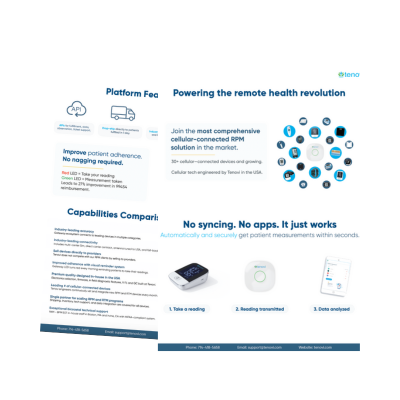Strict medication adherence is key to effectively managing chronic conditions. In fact, research shows that 80% or more medication adherence rates are generally needed for optimal therapeutic efficacy. However, adherence to chronic care medications is typically around 50%.
This article explores patients challenges in adhering to medication regimens and the impact on health outcomes and costs. We examine how remote therapeutic monitoring (RTM) with the use of a smart pill box can significantly aid in medication adherence tracking
Challenges in Chronic Care Medication Adherence
Lifestyle changes, treatment, and medication adherence all play roles in managing chronic conditions. COPD is a chronic disease that requires intricate medication regimes along with lifestyle changes. Patients with COPD often struggle to adhere to medication schedules. Their medication adherence rates fall within the 10% and 40% range.
Medication nonadherence can lead to poor patient outcomes, preventable hospitalizations, and significant healthcare costs. The following section covers medication nonadherence and intervention programs designed for medication adherence tracking.
Medication Adherence Tracking
Medication nonadherence occurs when a patient does not take a prescribed medicine or follow their healthcare provider’s instructions for taking the medicine. Many barriers may prevent patients from taking their medications. Some common reasons patients are non-adherent include cost concerns, forgetfulness, insufficient education on the medication’s importance, and adverse side effects.
The consequences of medication nonadherence extend to higher mortality rates. Studies show hospital admission rates spike by nearly 70% for non-adherent patients managing chronic conditions. Non-adherence also strains the healthcare system, costing the United States billions of dollars annually.
To tackle non-adherence, healthcare organizations have implemented various combined intervention programs, including counseling, synchronized refill schedules, awareness campaigns, and follow-ups. These education initiatives emphasize the importance of adhering to medications. Internet of Medical Things (IoMT) technology solutions like apps, smart pill bottles, and smart pillboxes provide dosage reminders.
Medication adherence tracking devices are reimbursable under Medicare for musculoskeletal, respiratory, and many behavioral health conditions. The following section covers smart pill box technologies and how their advanced features help patients take their medications properly.
What is a Smart Pill Box?
A standard pill box holds medications and identifies the day and time to take them. A smart pill box can do more than store the pills. A smart pill box uses technology to remind patients when it’s time to take their pills. This technology can alert the patient’s healthcare provider if a dose is missed.
The Tenovi Pillbox is a smart pill box that resembles a standard pillbox, so it’s easy to integrate into senior and chronic care patients’ daily routines. Built-in sensors automatically detect when pill compartments are opened or refilled. Cellular connectivity allows the device to transmit that adherence data automatically and securely through the Tenovi Cellular Gateway to a healthcare provider.
A red light on the corresponding pill compartment turns read along with the cellular Gateway to reminder the patient it’s time to take their medication. Once the opening or refilling event is transmitted to their care team, the Gatewat turns green so the patient knows their doctor has received the medication event.
With smart Pill box technology, healthcare providers monitor their patients’ medication-taking behavior remotely without any additional effort from the patient. By eliminating the need for apps, pairing, or extra steps, the Tenovi Pillbox improves potential barriers to adherence so patients can focus on their treatment rather than the technology.
Medication Adherence Tracking and Smart Pill Box Technology
Medication nonadherence can lead to poor health outcomes, increased hospitalizations, and substantial avoidable costs for the healthcare system. To combat this issue, smart pill box technologies represent a user-friendly and automated solution that addresses the critical challenge of medication adherence tracking.
The Tenovi Pillbox seamlessly integrates into patients’ routines, providing visual reminders and automatically transmitting adherence data to providers. By eliminating barriers and enabling a patient-centric approach, smart pill box technologies hold immense potential for improving medication adherence tracking, particularly for conditions like COPD, where adherence rates are critically low.


